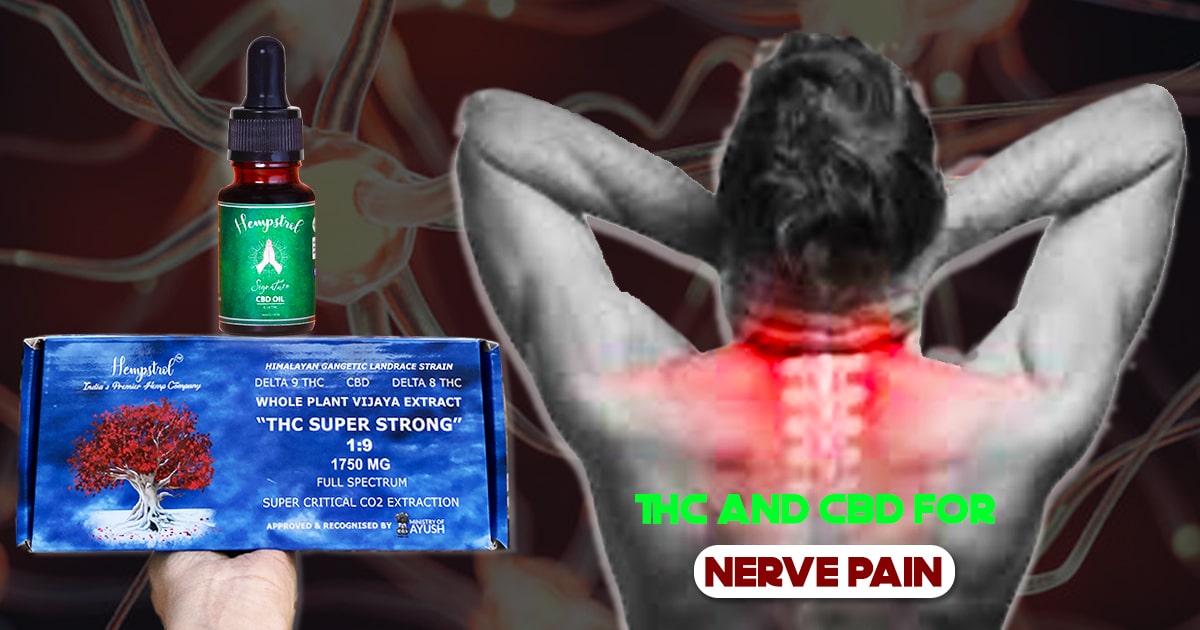Can You Use THC Oil For Nerve Pain? Get The Full Guide
Nerve discomfort is a typical problem that many people experience. Despite its prevalence, treating nerve pain is not always simple. The most typical method of treating nerve pain is with a prescription medicine, which can have negative effects. Another issue that has been reported in both clinical trials and anecdotal data is the persistence of pain after the use of pain medication or analgesics. Analgesics might fail for a variety of reasons. However, the question of what other alternatives pain practitioners, physicians, and patients have remained. A recent scientific breakthrough has brought to light an additional treatment option for neuropathic pain: cannabis. For generations, the cannabis plant has been used to treat pain. Researchers are currently understanding the possibility of medical cannabis for nerve pain.

What precisely is Nerve Pain?
Nerve pain, also known as neuropathic pain, is an unpleasant and sometimes debilitating illness that can make everyday tasks like walking or holding items difficult. Typically, the condition is chronic. It is frequently the result of a nerve illness, an accident, or inflammation.
Nerve pain signs and symptoms
Neuropathic pain is a subset of neuropathy, which is a larger term for nerve disease. It's a common symptom of chronic illnesses like:
Diabetes, multiple sclerosis, shingles, and ALS (amyotrophic lateral sclerosis) are all examples of diseases.
Injuries to the spinal cord
fibromyalgia
There are many different types of nerve injury, and not all individuals have the same symptoms. Some patients, for example, describe pins and needles in their hands, while others suffer numbness in one or more limbs. Other common symptoms are as follows:
Hand and foot pain (a typical symptom of peripheral neuropathy)
One or more limbs are numb or tingling.
Muscle weakness, which can cause balance issues and difficulties walking
Temperature sensitivity (some diabetics suffer from cold extremities)
Blood pressure decrease

What causes nerve pain and how may THC oil help?
Nerves transport data to and from the brain. Inflammation or injury, sickness, diabetes, or old age can all cause them to deteriorate. Nerve tissue can degenerate naturally as we age. Nerve damage can result in pain, numbness, and weakness in the afflicted areas. Nerve injury can occur without your knowledge.
Nerve damage produced by a medical disease such as diabetes is usually temporary and reversible once the underlying health problem is cured. Medication can be used to decrease inflammation and reduce swelling around afflicted nerves.
In other types of nerve damage caused by accident or trauma, recovery may take longer because scar tissue has formed around wounded nerves that have not healed properly since being harmed (or have not been repaired at all).
Many societies throughout the world have long utilised cannabis or THC oil as an analgesic. According to recent study, cannabis may be especially beneficial against neuropathic pain caused by nerve damage or disease.
Nearly 500 distinct chemicals are found in the plant, but two major cannabinoids stand out:
Tetrahydrocannabinol (THC) - THC oil is the plant's major psychoactive component. It is responsible for the "high" sensation experienced by cannabis users.
Cannabidiol (CBD) - CBD is regarded as a necessary ingredient because it has no intoxicating effects. CBD may help lower anxiety and inflammation, both of which can contribute to pain, according to research.
Cannabis, in addition to CBD and THC, contains potentially medicinal components such as terpenes, flavonoids, and other phytocannabinoids. When these substances are combined, they produce what is known as the entourage effect.
The entourage effect proposes that when cannabinoids and other substances are combined in the appropriate ratios, they are more effective than any one of them alone. Some cannabis users who use it for pain say that using a full-spectrum product (one that contains all of the cannabinoids and terpenes found in cannabis) reduces their pain.
What effect do cannabinoids have on pain perception?
The endocannabinoid system regulates a variety of biological functions.
Pain perception is one of the most prominent of these functions. THC and CBD are cannabinoid receptor CB1 and CB2 agonists.
CB1 receptors are mostly located in the central nervous system. They are involved in locomotion, memory, and pain signal modulation.
CB2 receptors are plentiful in peripheral tissues and organs. They play a role in the regulation of inflammation, allodynia (severe pain sensitivity to touch), and hyperalgesia (extreme pain reactions).
Our neurons become more sensitive after a nerve injury. This procedure entails a series of biological events that result in an increase in pain perception. According to research, cannabis can influence how these processes occur. CB1 receptors, once activated, slow the body's perception of pain. Meanwhile, CB2 receptors that are engaged help to reduce overall pain perception.

What research has been done on medical cannabis for nerve pain?
It should come as no surprise that a vast body of evidence supports the use of cannabis to relieve nerve pain. Cannabis has traditionally been utilised for its analgesic (pain-relieving) effects. THC and CBD interact with the ECS, which plays an important role in pain perception.
What was once considered traditional medicine is currently being researched for widespread application in both medical and therapeutic settings. Today, researchers are looking into its potential for clinical uses against specific types of neuropathic pain. Nerve discomfort can be debilitating in and of itself for many people. Those who suffer from it also have other symptoms that can make life tough. Neuropathy can aggravate symptoms such as depression, anxiety, sleeplessness, and restless leg syndrome. Cannabis has a number of characteristics that can help with various comorbidities. THC is renowned for its propensity to make people feel tired or relaxed after usage; this may be beneficial for those suffering from nerve-related insomnia.
Reduced inflammation: Cannabinoids, such as CBD, are anti-inflammatory as well as antioxidants, which may explain their use in treating neuropathy symptoms such as tingling or numbness caused by injured nerves.
Improved mood: Research indicates that certain cannabinoids can help with mood problems such as depression or anxiety disorders that occur in conjunction with chronic pain issues.

Conclusion: THC and CBD for Nerve Pain
As demonstrated, cannabis has the potential to alleviate the symptoms of neuropathic pain. THC and CBD in cannabis help alleviate inflammation, spasms, and other symptoms caused by nerve damage or injury. In clinical trials, researchers frequently administer doses to patients via smoking cannabis. Other ways, however, are employed. Nonetheless, these studies indicate the general safety of cannabis use in comparison to other nerve pain therapy approaches. More study is needed to include cannabis as a conventional treatment for this condition. The optimum technique to use medicinal cannabis for nerve pain will be determined by your personal needs and preferences. Before beginning any treatment for nerve pain or buy thc oil for nerve pain online consult with your doctor or a specialist.













-600x450.jpg)




